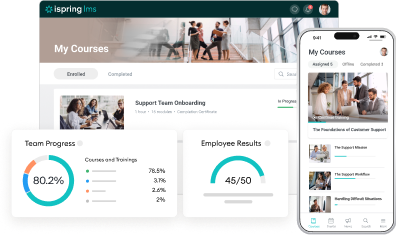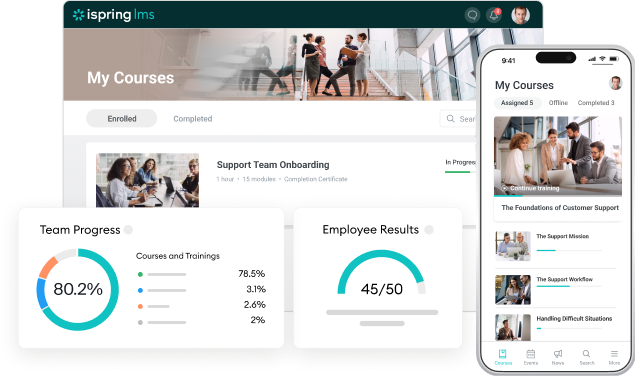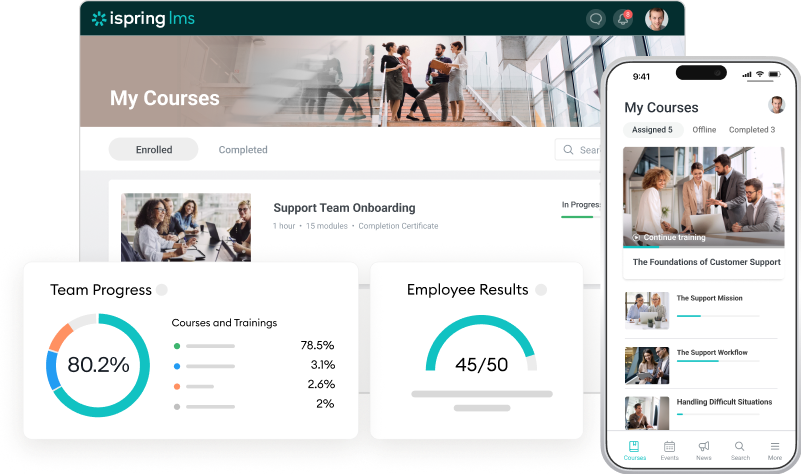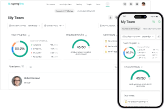The 14 Best Cloud-Based Learning Management Systems (2026)

More businesses and schools are moving away from traditional, on-site learning platforms in favor of cloud-based learning management systems (LMSs). Over 87% of users had already made the switch to cloud-based LMS, leaving on-premise systems with only 13% of the market.
Why? Many companies are switching to cloud-based LMSs because they’re more flexible, cost-effective, and accessible from anywhere. Also, cloud-based systems grow with your organization without expensive maintenance.
As the cloud-based LMS market keeps growing—expected to hit $70.83 billion by 2030, up from $24.05 billion in 2024 — it’s becoming harder to figure out which solution best fits your needs.
So, to facilitate this process, we’ve put together a list of the 14 best cloud management systems for 2026.
Short on time? Here’s a summary of our cloud-based LMS comparison. Find the one that interests you and jump right to its details.
| Cloud-based LMS systems | Pricing | Best for |
| iSpring LMS | Starts at $4.46/user/month. You can try any paid plan during a 30-day free trial | Businesses who want easy eLearning delivery and value integration with iSpring Suite (a PowerPoint-based authoring toolkit) |
| Docebo | Starts at $25,000/year | Large enterprises needing AI-powered learning and automation |
| TalentLMS | Free plan available; paid plans start at $109/month | Companies that manage multiple brands |
| Litmos | Upon request | Industries running a lot of compliance training |
| EducateMe | Starts at $150/month | Educational institutions and boot camps in need of automated course management |
| Moodle Cloud | Starts at $130/year | Organizations that need an affordable and customizable learning platform. But note that the storage is limited to 5GB on the top-tier plan. |
| Skyprep | Upon request | Businesses prioritizing social learning and learner interaction |
| LearnWorlds | Starts at $24/month | Course creators focused on marketing and selling their courses online |
| 360Learning | Starts at $8/user/month | Organizations that rely on team-based course creation |
| ProProfs | Free plan available; paid plans start at $49/month | Unlimited storage for business training needs. But note that there are no advanced reporting or data export options like CSV or PDF |
| Absorb LMS | Upon request | Businesses with complex compliance training requirements |
| Blackboard Learn | Starts at $9,500/year | Academia and educational institutions |
| LearnUpon | Upon request | Institutions that need detailed reporting on learner progress |
| Canvas | Free for teachers and students, with premium plans starting at $99/month. | K-12 and higher education institutions that want a free or affordable LMS. |
What Is a Cloud-Based LMS?
A cloud-based learning management system (LMS) is a digital platform that hosts and delivers educational and training content.
Users can access training materials, courses, and resources remotely from any location via the internet. In other words, working with a cloud-based learning management system is like having your own virtual school or training hub accessible online.
What Is the Difference Between Cloud-Based and On-Premise LMSs?
The main difference between a cloud-based LMS and other LMSs is hosting and accessibility.
A cloud-based LMS runs on remote servers and is accessible via web browser.
On the other hand, an on-premise LMS is hosted locally on a company’s servers. It requires dedicated IT resources for regular maintenance and updates.
Some LMSs might be self-hosted or hybrid, blending cloud-based and local hosting for more control but incurring higher infrastructure costs.
Benefits of a Cloud-Based LMS
Beyond the usual LMS benefits, there are extra advantages, such as:
- Improved learner engagement. Nearly 9 in 10 workers want training available anytime, anywhere. Cloud-based LMS platforms make it easy to provide flexible, on-demand learning that keeps learners engaged.
- Automatic updates and maintenance. Cloud LMS providers manage and keep your system up to date and secure. You would require fewer in-house IT employees to handle updates or security patches.
- Cost savings. Most cloud-based LMSs on our list come with subscription-based pricing with no extras. This means no unexpected upgrade expenses, hardware costs, or ongoing maintenance.
- Scale on demand. Easily adjust storage, user capacity, and features as your training needs grow or change without deadline with complex infrastructure updates.
- Integrations. Cloud-based LMSs are integrated with tools like Google Workspace, Microsoft 365, and popular HR systems (e.g., Workday, BambooHR) to sync data, manage tasks, and track employee performance all in one place.
- Collaborations. Use built-in features like live chat, direct messaging, and videoconferencing to facilitate real-time communication between team members, no matter where they are.
The 14 Best Cloud-Based LMS Solutions
Here are the 14 best cloud-based LMS examples chosen for their features, ease of use, integrations, and security.
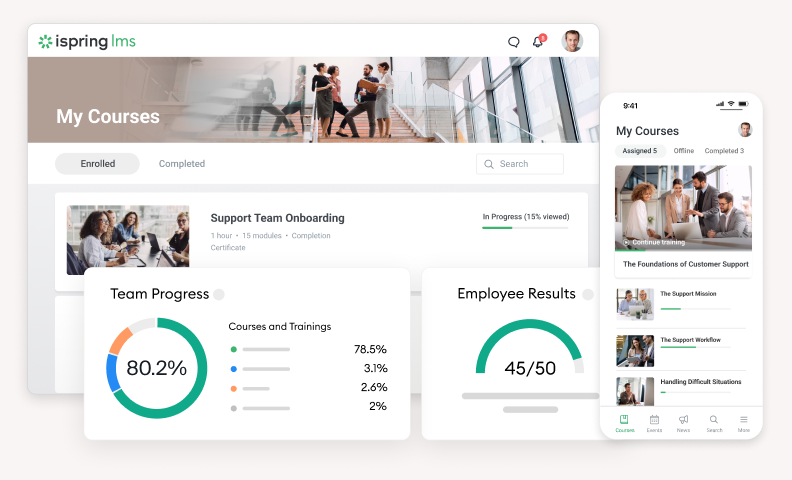
Deliver engaging training, track learner progress, and manage certification with iSpring LMS.
iSpring LMS is a feature-rich cloud-based LMS created by iSpring Solutions, a leading global eLearning software provider. The LMS is hosted on Amazon AWS, making it reliable and crash-proof for data protection.
iSpring LMS gives teams and organizations an easy way to deliver training programs. Its accessibility features are unbeatable. Learners can access materials anytime, anywhere, even offline, through the iSpring LMS app.
With tools for learning paths, assessments, and progress tracking, businesses can create structured, results-driven training. It also includes ready-made courses from iSpring Academy, which facilitates quick training rollouts.
Since it’s bundled with iSpring Suite, a PowerPoint authoring tool, you can create and deliver training in a singular ecosystem.
iSpring LMS’s key features
- Content creation. Build eLearning courses using the native authoring tool.
- Reporting. Track learner progress in real-time, helping managers identify gaps and provide support.
- 360-degree feedback. The 360-degree performance appraisal gathers feedback from peers, managers, and self-assessments to provide a well-rounded view of an employee’s performance.
- SCORM compliance. Supports SCORM 1.2 and 2004 for easy course compatibility.
- Certifications. Issue certificates from scratch or with ready-made templates.
- Gamification. Engage learners with newsfeeds, learner cards, quizzes, and interactive games.
- Integrations. Connect with platforms such as Zoom, MS Teams, Salesforce, ProctorEdu, OrangeHRM, BambooHR, and more through API technology.
- Pre-made content. Access a library of ready-made courses to jumpstart training programs.
- White-labeling. Customize the platform’s branding to your company’s identity.
- Mobile learning. A mobile app with offline access for flexible learning.
- Security. Data encryption, SSO (Single Sign-On), and role-based access control.
Pricing
Pricing starts at $4.46 per user/month (billed annually) for 300 users, dropping to $3.97 for 500 and $3.58 for 1000. Custom plans are available.
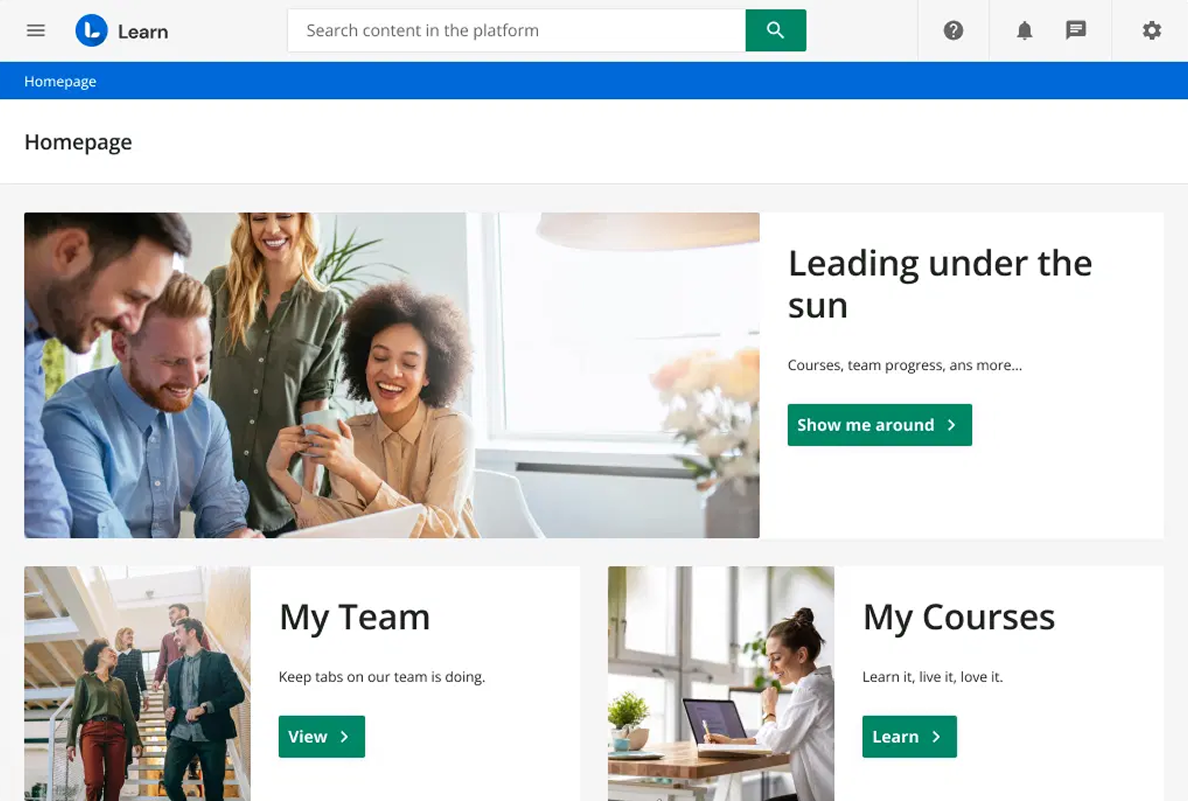
Save time by letting Docebo handle training reminders and follow-ups
so you can focus on strategy.
Docebo is a cloud-based LMS platform for organizations that want AI-powered training. It automates learning, adapts to each user, and handles admin tasks so teams can focus on growth instead of micromanaging the training process.
The system creates personalized learning paths and recommends content based on learners’ needs. Businesses looking for cloud-based LMS solutions that simplify training can use Docebo to handle enrollment, course assignments, and reporting with minimal effort.
Built-in collaboration tools encourage social learning, and mobile apps let users access training anytime. Analytics dashboards provide clear insights into learner progress, and Docebo connects with popular business apps to keep everything running smoothly.
Docebo’s key features
- Learning path. AI-driven learning adapts to each user for personalized experiences.
- Automation. Streamline enrollment, course assignments, and reporting.
- Social learning. Enhance engagement with collaborative features.
- Mobile access. Enable flexible learning on the go.
- Advanced analytics. Track learner progress and program effectiveness.
- SCORM compliance. Supports SCORM 1.2 and 2004 for seamless content integration.
- Security. Includes multi-factor authentication, data encryption, and access control.
- Integrations. Connect with over 400 third-party apps like Salesforce, Workday, and HubSpot.
Pricing
Docebo’s pricing starts at ~$25,000/year for the Engage Plan and ~$40,000/year for Elevate, with custom enterprise pricing.
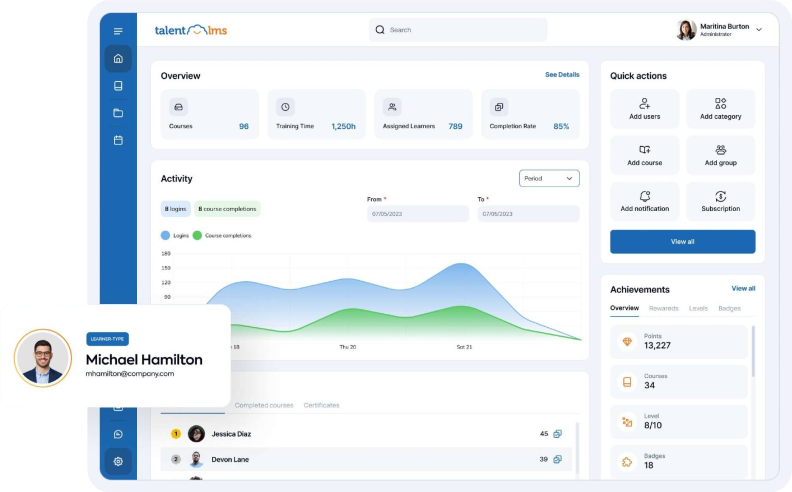
Develop tailored learning experiences for different audiences by establishing
distinct portals and sub-portals.
TalentLMS is an excellent choice for companies that manage multiple brands, like Pottery Barn.
This cloud-based LMS lets you personalize training portals and sub-portals, with each one having its own settings. It makes delivering courses effortless and tailored to different audience needs.
The platform also has useful reporting tools, such as customizable reports, activity logs, and Training Matrix for tracking progress. Security is a priority, with features like encryption and data backups to keep your information safe.
You can create and update training content with the easy-to-use course builder, automate recertification reminders, filter by specific teams, and implement games to increase learner engagement.
Talent LMS’s key features
- Content creation. AI tools and a drag-and-drop interface for easy course creation.
- Interactive learning. Points, badges, and leaderboards to engage learners.
- White-labeling. Custom domains and branding options.
- Certification. Track and export certificates.
- Feedback tools. Surveys and ratings for course improvement.
- Integrations. Connects with HR tools, Zapier, and more via API.
- SCORM compliance. Supports SCORM 1.2 and SCORM 2004 for course tracking.
- Security. Two-factor authentication and data encryption for a secure learning experience.
Pricing
Free for up to 5 users/10 courses; paid plans begin at $109/month (billed annually) for 40 users, $229/month for 70 users, and $399/month for 100 users, with Enterprise options priced on a custom basis.
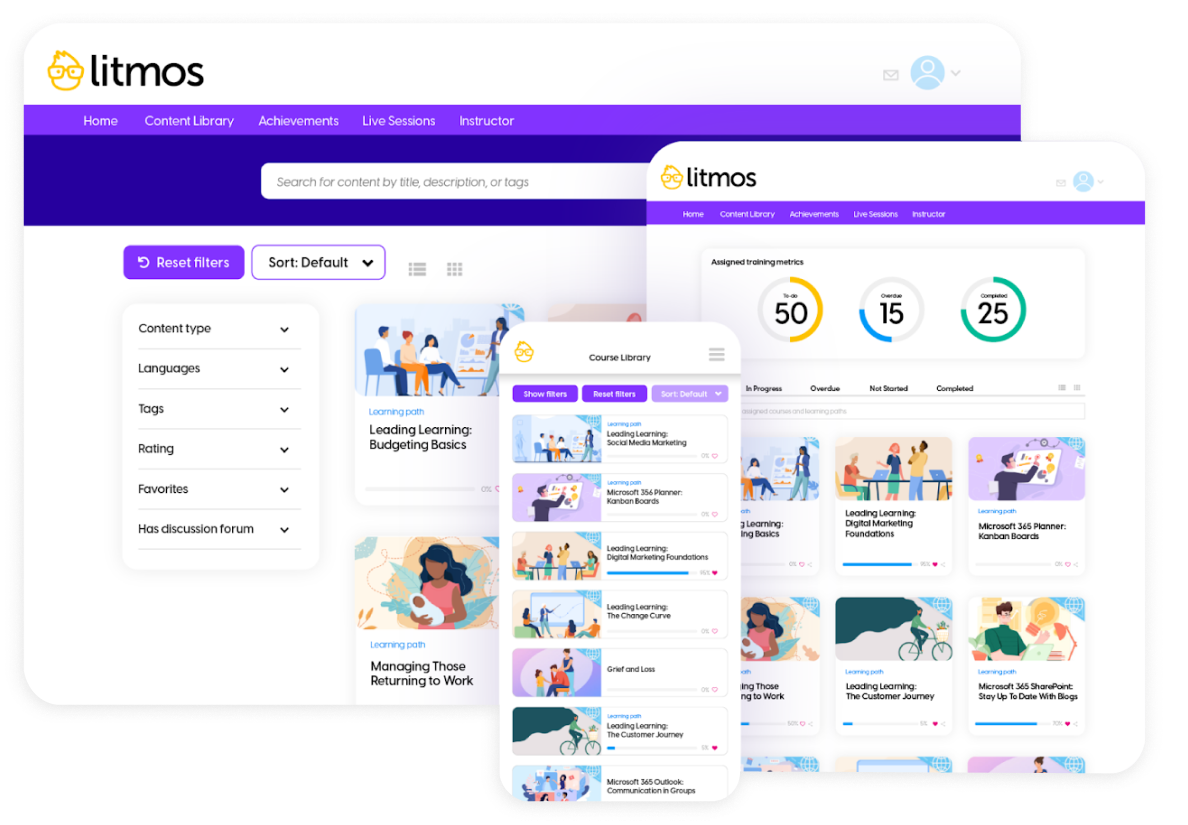
Launch compliance training programs fast with ready-made courses to meet your needs.
Litmos is a cloud-based LMS platform for businesses that need to get training up and running quickly. Healthcare organizations use it for courses on patient care and HIPAA compliance.
With more than 98,000 ready-made courses, it helps companies roll out compliance training, employee onboarding, and customer education fast. You can use its reporting engine to generate custom reports and auto-schedule report delivery when needed.
It features data encryption and role-based access controls and complies with GDPR and SOC 2 standards.
Litmos includes an AI assistant for follow-ups and a dashboard to track completion rates and overdue training. It integrates with 100+ tools like Salesforce, Microsoft Teams, and HRIS platforms, with an open API for custom apps—offering one of the best cloud-based LMS experiences that fits into existing workflows.
Like several other LMSs, Litmos offers eCommerce capabilities. They allow organizations to easily monetize eLearning content.
Litmos’ key features
- Compliance training. Pre-built courses for finance, healthcare, and corporate compliance.
- Automation. AI-driven task automation for enrollments, alerts, and reporting.
- Security. Data encryption, access controls, and GDPR/SOC 2 compliance.
- SCORM compliance. Supports SCORM, xAPI, and AICC for content compatibility.
- Integrations. Connects with Salesforce, Microsoft Teams, and 100+ business tools.
- AI-powered content creation. Built-in authoring tool with AI-assisted course design.
- eCommerce. Sell courses online with Shopify integration.
- White-labeling. Custom branding for learning portals.
- Advanced analytics. Custom dashboards for tracking learner performance.
Pricing
Upon request.
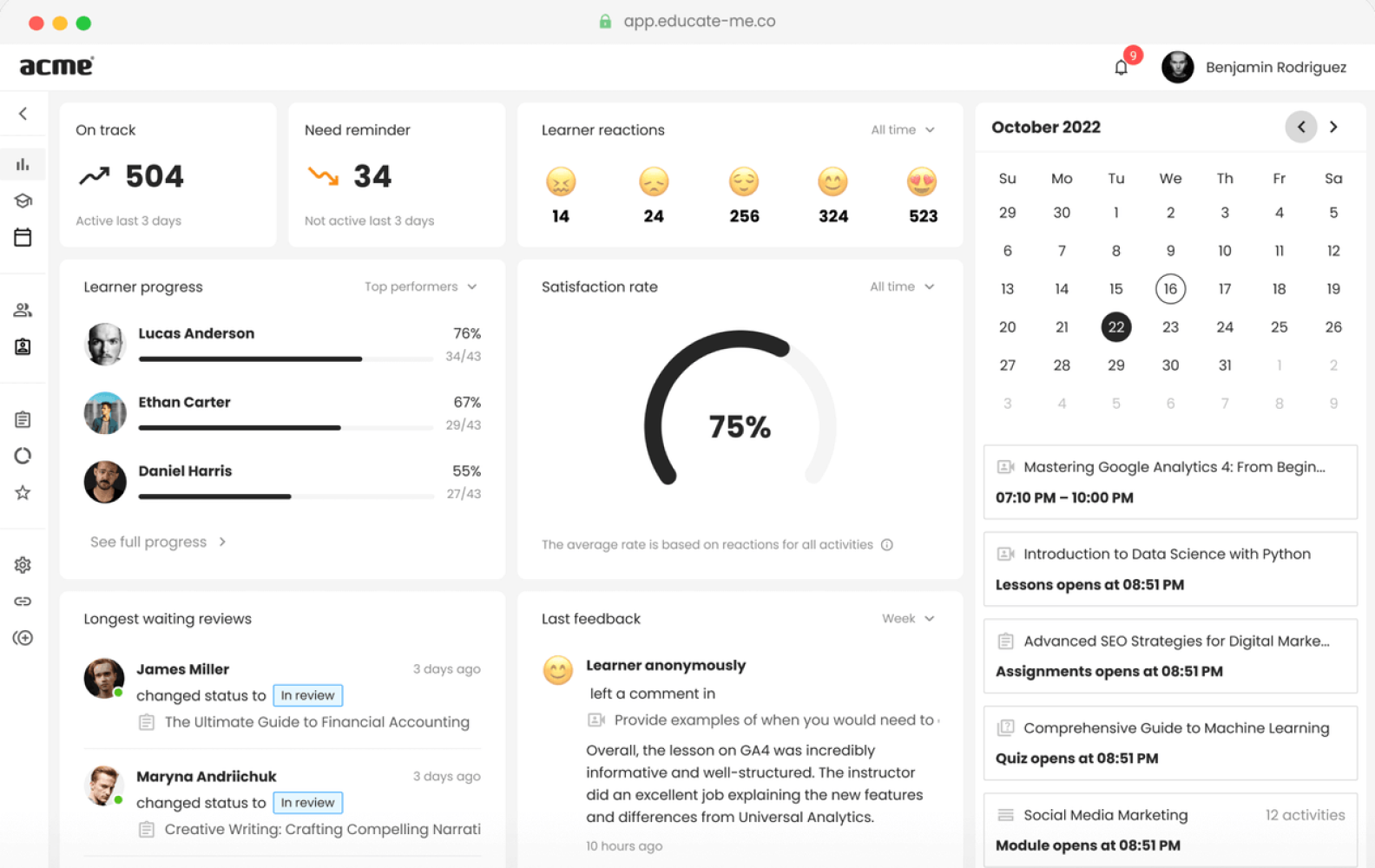
Save time with EducateMe’s automated course duplication to copy and
modify courses for different cohorts.
EducateMe is a top choice if you’re looking for an all-in-one platform built for academic institutions, boot camps, and digital course creators. It’s designed to simplify online learning with a course builder that lets you create engaging lessons within minutes.
You can use real-time dashboards and analytics to track learner progress and monitor course completions, module engagement, and overall performance.
In addition, with automated assignment management, live session hosting via Zoom or Jitsi, and customizable branding, EducateMe takes care of administrative tasks so you can focus on teaching.
EducateMe’s key features
- Automated course duplication. Copy and modify courses for different cohorts in seconds.
- Live session hosting. Integrate with Zoom or Jitsi for seamless live classes.
- Custom branding. Match your platform to your brand with logos, colors, and fonts.
- SCORM compliance. Ensure that content works smoothly with SCORM-compliant courses.
- Advanced user roles. Control access with customizable user roles and permissions.
- Automated reminders. Send automatic reminders for live sessions to keep learners on track.
- Analytics and reporting. Track learner progress and engagement with real-time reports.
- Security. Protect your data with encryption, SSO options, and custom domains.
Pricing
EducateMe pricing starts at $150/month for Advanced (50 active users) and $240/month for Pro (80 active users), with custom pricing for Enterprise (unlimited users).
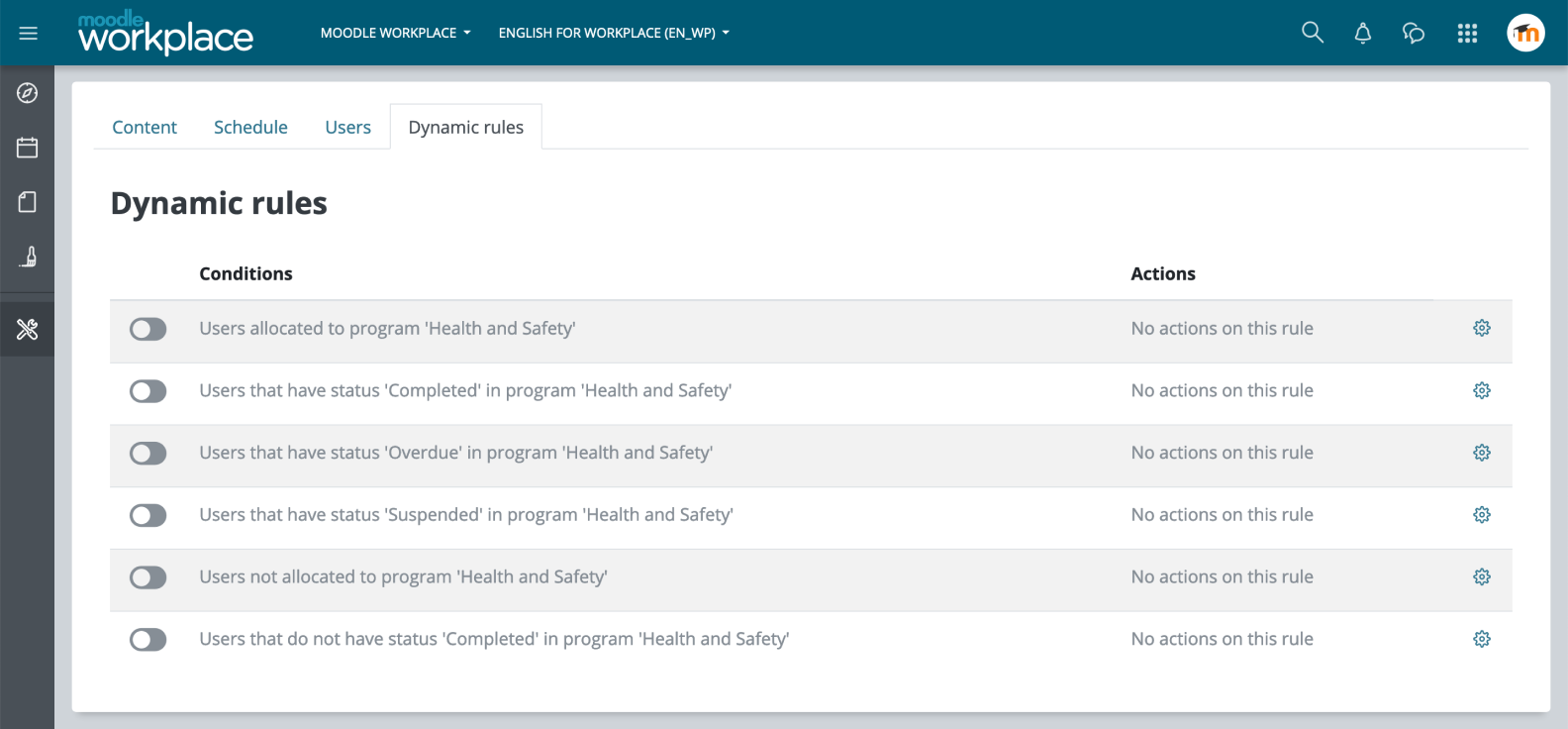
Effortless online course creation with a fully hosted platform for small businesses.
Moodle Cloud is unique because it is a cost-effective way to start delivering eLearning content, whether to train employees, teach students, or perform any other kind of online learning.
Moodle Cloud comes equipped with different customization options and video conferencing. Unlike other tools on our list, MoodleCloud offers limited storage, with the top-tier plan offering only 5GB of space, which may not be sufficient for larger course catalogs.
The Moodle Cloud LMS’s key features
- SCORM compliance. Deliver SCORM-compliant courses for a seamless learner experience.
- Video conferencing integration. Host live sessions with participants for real-time interaction.
- File storage integration. Sync your content with cloud storage providers like Google Drive and Dropbox.
- PDF converter. Convert course content into PDF format for easy distribution.
- Custom branding. Personalize the platform with your logo and theme to match your brand.
- Security. Protect your data with encryption, two-factor authentication, and regular security audits.
Pricing
Moodle Cloud’s annual plans start at $130 for 50 users, $220 for 100, $400 for 200, $920 for 500 (with custom domain add-on), and $1,740 for 750 (with custom domain included).
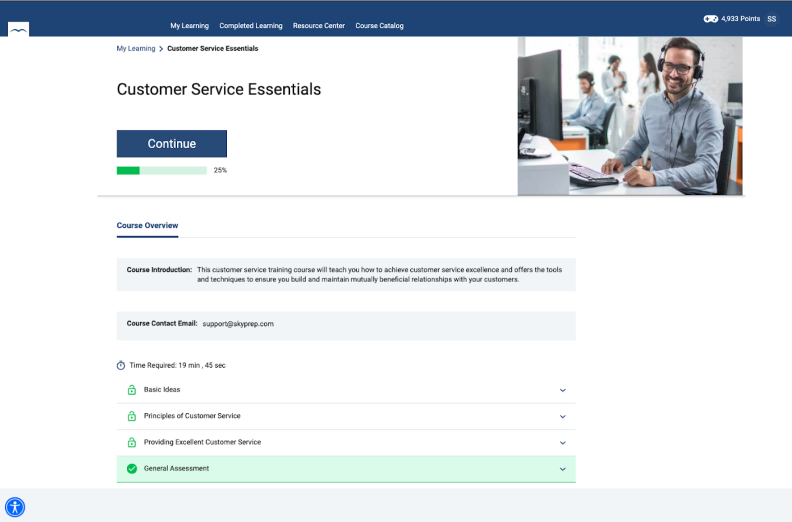
Encourage engagement with an interactive message board for learners to share insights, post content, and connect with peers.
SkyPrep is a user-friendly cloud-based LMS platform designed for organizations that prioritize collaboration. The platform combines social learning tools with gamification features to keep learners engaged, that include badges, leaderboards, and point-based rewards.
Learners can also use the message boards to send announcements, interact with the team, or share content with others. Its security features include data encryption, role-based access control, and compliance with GDPR and SOC 2 standards. Multi-tenant capabilities allow companies to manage multiple branded training platforms under one account, which also makes it a good cloud-based LMS for vendor training.
SkyPrep has a mobile app that allows learners to complete courses and assessments using their smartphones.
SkyPrep’s key features
- Gamification. Badges, points, and leaderboards encourage engagement.
- Interactive message boards. Learners share knowledge and participate in discussions.
- SCORM compliance. Compatible with third-party eLearning content.
- Enterprise-grade security. Data encryption and SOC 2 compliance.
- Mobile access. Complete courses and assessments from any device.
- eCommerce functionality. Sell courses and manage transactions with ease.
Pricing
Upon request.
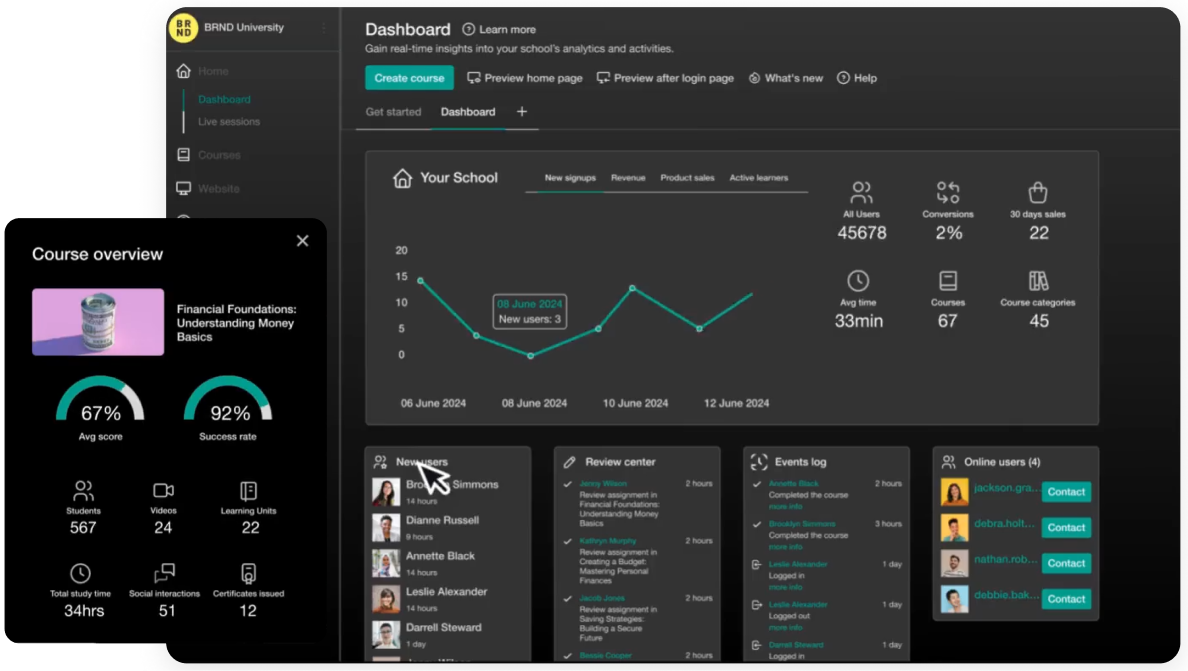
An AI-powered LMS for creating and selling online courses.
LearnWorlds is a cloud-based LMS for course creators who want to build, market, and sell online courses.
It features a robust course builder that supports various learning approaches, like module-based skill training or self-paced training, and multimedia-rich content, including videos, eBooks, quizzes, and interactive self-reflection tools.
With a strong focus on eCommerce, LearnWorlds provides built-in tools for membership sites, subscriptions, and branded course platforms, which makes it a top choice for educators, entrepreneurs, and training businesses.
However, some say the user interface feels cluttered and the course creation workflows could be more intuitive.
LearnWorlds’ key features
- Multimedia-rich courses. Add videos, eBooks, quizzes, and self-reflection activities.
- AI-powered learning. Automate content creation and enhance engagement.
- eCommerce functionality. Sell courses with subscriptions, memberships, and custom pricing.
- Website and app builder. Create a branded learning platform with no coding.
- Analytics and reporting. Track learner progress and sales performance.
- SCORM compliance. Supports importing third-party learning content.
- Security. Data encryption, GDPR compliance, and role-based access controls.
Pricing
Starter plan at $24/month with a $5 fee per course sale, Pro Trainer plan at $79/month, and Learning Center plan at $249/month, with no transaction fees.
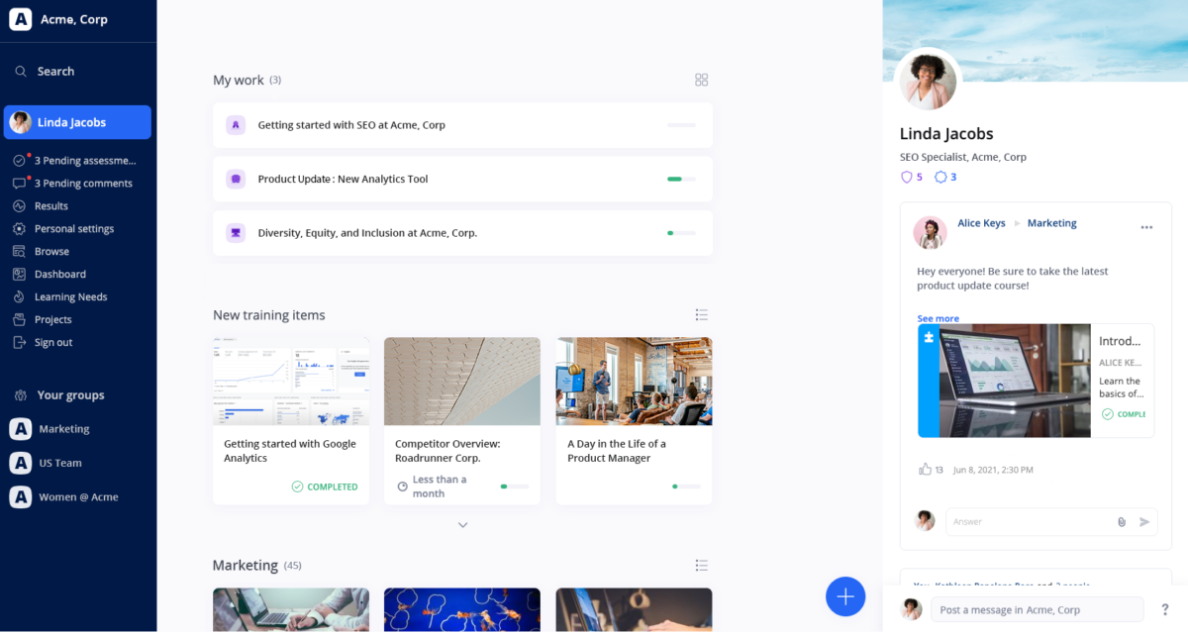
Empower your team to create and share courses effortlessly with a platform designed for collaborative learning.
360Learning stands out by enabling subject matter experts within your organization to co-create up-to-date content and training materials that meet industry standards.
Its user-friendly interface encourages engagement through discussion forums and in-course feedback, transforming traditional training into an interactive experience. Organizations looking for advanced customization may find this LMS more limited than others on our list.
360Learning’s key features
- Collaborative course creation. Teams can co-author courses, fostering a dynamic and interactive learning environment.
- In-platform feedback. Learners and instructors can engage in discussions, comments, and reactions within the course.
- Advanced analytics. Track learner progress, assess course effectiveness, and generate reports for data-driven decisions.
- SCORM compliance. Supports SCORM 1.2 and SCORM 2004 (2nd, 3rd, and 4th editions) for easy content import.
- Integrations. Connect with third-party tools, including HR systems and content providers.
- Mobile accessibility. Access courses on any device with a responsive, mobile-friendly platform.
- Security. Data encryption, AI data privacy control, EDR/XDR threat detection, and more.
Pricing
Starts at $8 monthly per registered user and up to 100 users.
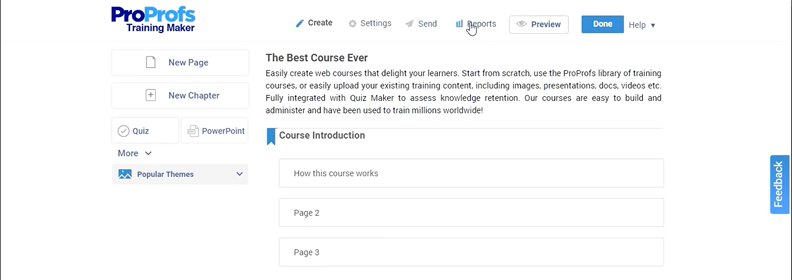
Create, manage, and deliver unlimited courses for businesses of all sizes.
Two things make ProProfs stand out on our list: unlimited storage, so you can upload and organize as much content as needed, and smart quiz analytics, which breaks down results to show exactly how each student or group is performing.
Its simple course builder, automated grading system, and detailed analytics help businesses track progress and improve training efficiency.
One limitation is the platform’s basic UI, which some users don’t find as friendly as our other alternatives.
ProProfs’ key features
- Unlimited storage. Upload and store as much content as needed.
- SCORM compliance. Supports SCORM-based courses for seamless integration.
- AI-powered reports. Gain insights with automated analytics.
- Integrations. Advanced integrations with tools like Google Analytics, Zapier, and Salesforce.
- White labeling. Personalize courses with your company’s logo and colors.
- Mobile learning. Access courses anytime on any device.
- Security. Strong security with SSL encryption and role-based access controls.
- Course library. Use pre-built courses for quick training deployment.
- Certification management. Automate course completion certificates.
Pricing
Free plan for up to 10 learners; paid plans start at $49/month per author for unlimited features, analytics, and integrations.
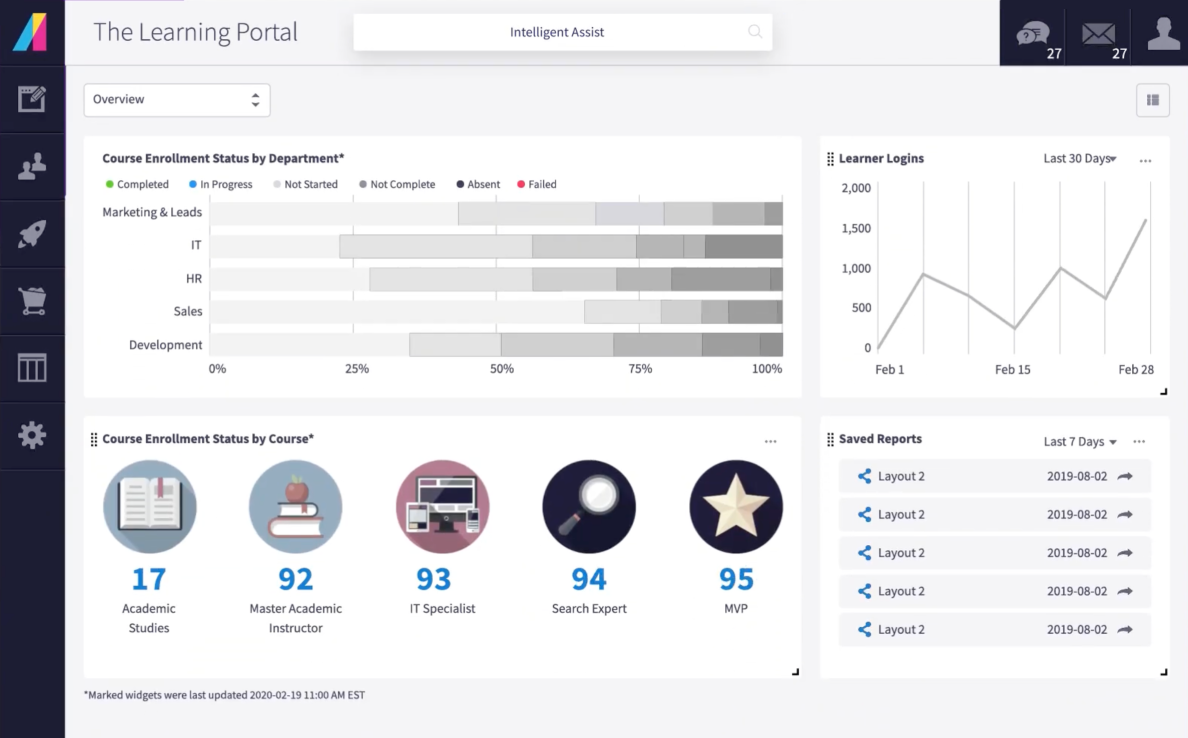
Use Absorb LMS’s self-service business intelligence tool to generate in-depth reports and insights.
Absorb LMS is a great fit for creating and managing compliance courses with automated features like scheduled notifications, certificate tracking, and course enrollment. Access a library of ready-made courses through Absorb Amplify, covering key topics such as GDPR, OSHA, and harassment prevention.
It also takes reporting and analytics a step further using Absorb Analyze, the platform’s robust reporting tool, which lets you generate reports and insights without technical skills.
Absorb also simplifies audits by providing automated, easy-to-read summaries of complex compliance data that help managers make quick, informed decisions.
Absorb LMS key features
- AI-powered personalized learning paths. Tailor educational experiences to individual learner needs.
- Automation. Save time by streamlining scheduling, reporting, and learner management.
- Customizable dashboards. Enable instructors to track progress and manage courses with ease.
- Pre-made content library. Access courses from providers like LinkedIn Learning and SkillSoft.
- White-labeling. Customize branding to reflect your organization’s identity.
- Integrations. Connect with tools like HubSpot and Zoom. Use RESTful APIs and webhooks to integrate with others.
- Security. Protect user information with robust encryption protocols.
- SCORM compliance. Ensure compatibility with diverse eLearning content formats.
Pricing
Upon request.
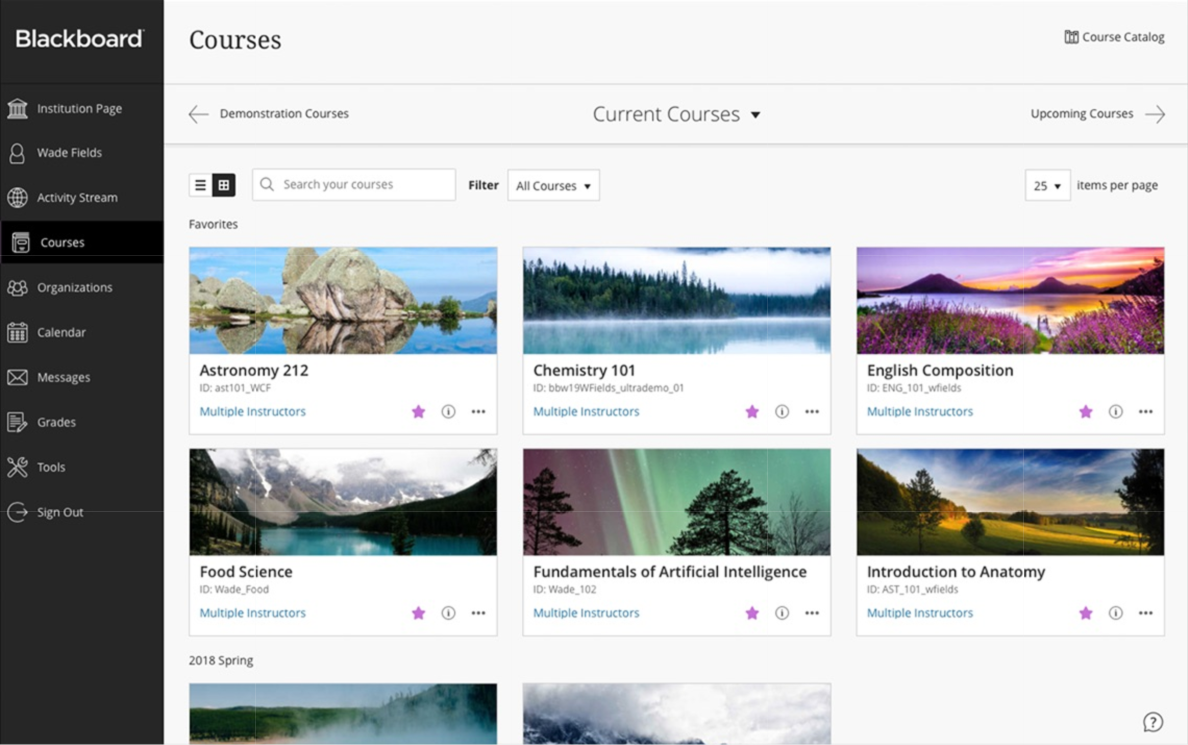
It empowers instructors with automated tools and lets students engage
with their courses from any device.
Blackboard (Anthology) makes course management easier with tools that let instructors handle assignments, tests, and grades all in one place. Using its built-in content authoring tool, which includes an AI-powered design assistant, instructors can create personalized learning paths.
The platform is a cloud-based LMS for K-12 schools that integrates seamlessly with educational institutions and campus systems for student enrollment and progress tracking. For assessments, instructors can use a comprehensive set of tools to design quizzes, polls, and surveys with automatic grading, thereby saving time.
Blackboard is one of the most widely used learning management systems (LMSs) globally, especially in higher education, and as a cloud-based LMS for continuing education and training.
Blackboard’s key features
- AI-powered content creation. Use Design Assistant to create personalized courses.
- Integrations. Connect seamlessly with student information systems and third-party tools.
- Communication tools. Enable instant messaging and discussion boards for collaboration.
- Feedback tools. Collect classroom insights to improve learning experiences.
- Video studio. Create engaging multimedia content with ease.
- Automatic grading. Save time with auto-graded assessments and quizzes.
- Tracking and reporting. Monitor learning progress for both students and instructors.
Pricing
Blackboard Learn’s pricing starts at $9,500 per year.
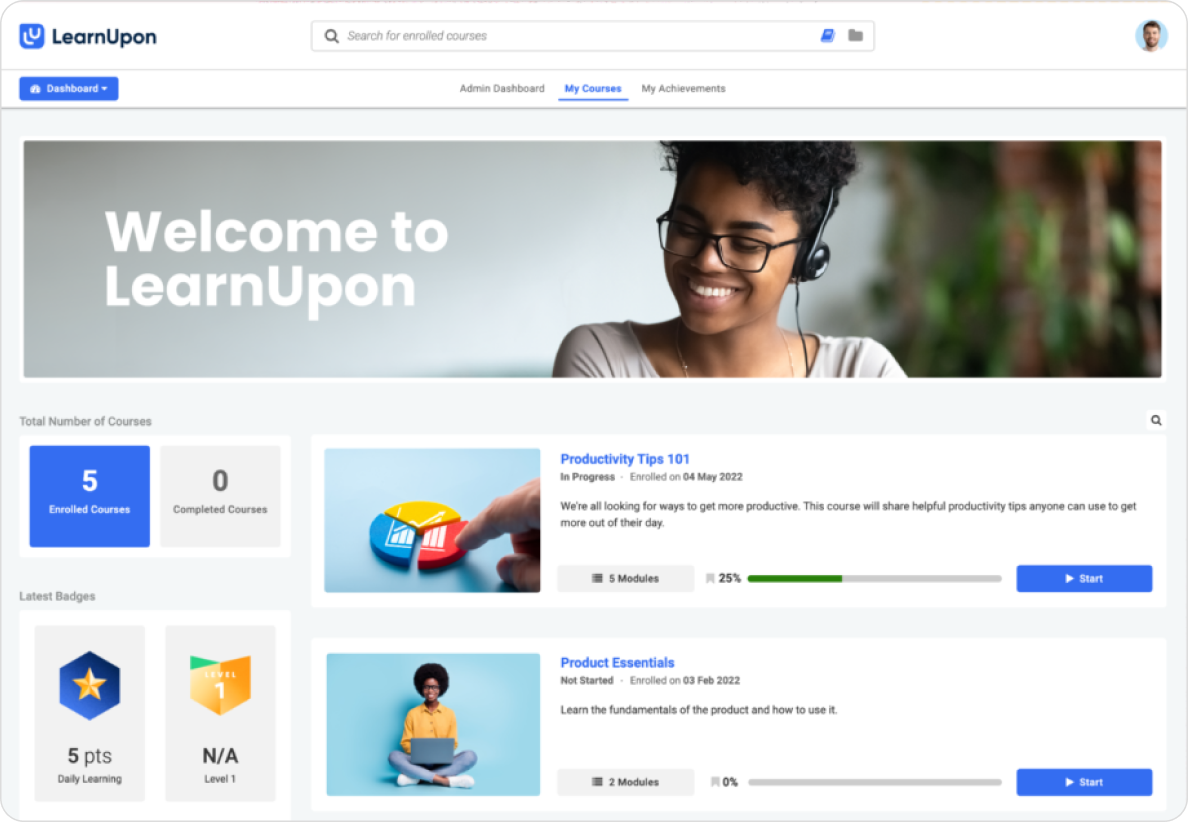
Simplify reporting with pre-made reports and detailed tracking.
Reporting of any kind can be complex and tricky. LearnUpon, a cloud-based LMS for medium- and small-sized corporate clients, eliminates this complexity by providing pre-made reports like learning paths, live learning reports, and course status.
LearnUpon’s report goes beyond basic completion tracking. Instead, it provides detailed insights into learner activity. The Course Status report highlights completion rates, showing who hasn’t started, is in progress, and has finished. Filters like enrollment date help identify users who never logged in after being added. This gives you an overview of learner progress, pinpointing where individuals struggle or drop off.
You can manage multiple training portals, track learner progress through dashboards, and integrate with tools like Salesforce, Microsoft Teams, and Zoom.
LearnUpon’s key features
- Multi-portal management. Manage different teams or clients with ease.
- SCORM, xAPI, and cmi5 compatibility. Ensure flexible and seamless content usage across standards.
- Integrations. Connect with HR systems, CRMs, and communication tools for streamlined workflows.
- White-labeling. Customize branding to align with your organization’s identity.
- Reporting. Access pre-made reports, including Course Status and Learning Path reports.
- Customizable learning paths. Create tailored training experiences for diverse needs.
Pricing
Pricing is available upon request, with plans based on the number of active users.
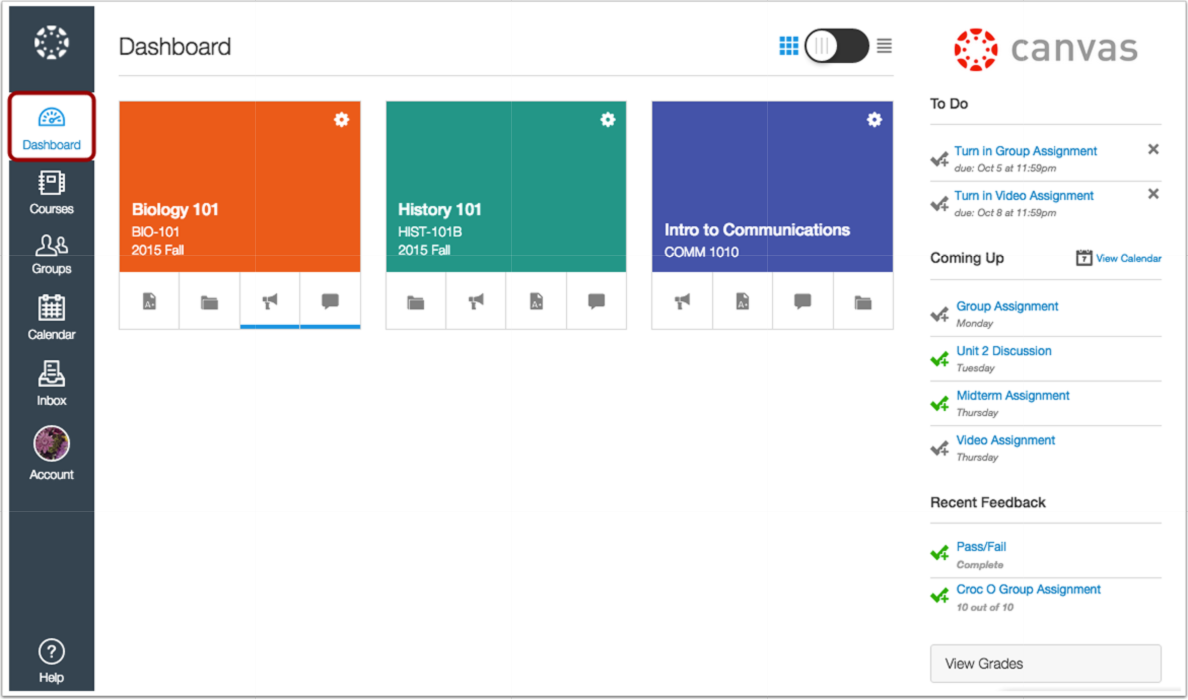
Built for K-12, higher education, and beyond.
Canvas is a respected and long-running LMS platform that’s especially favored by educational institutions.
Canvas is stricter about replicating the classroom experience online and comes as a free cloud-based LMS for teachers and students. This makes it a great solution for educators who want to integrate technology into their teaching at no cost.
Unlike many other LMS options, Canvas offers powerful school applications like Canva Studio, a tool for creating interactive videos, and Canvas Catalog, for building customized course catalogs for different student groups. Beyond course management, Canvas has built-in authoring tools and a quiz maker to help teachers create engaging and interactive lessons.
This cloud-based LMS provides tools for creating, managing, and delivering courses for K-12 students, university students, and even corporate learners.
Canvas’s key features
- Content creation. Built-in authoring tool and quiz maker for easy course creation.
- Canvas Studio. Design interactive videos to engage learners.
- Reporting. Track learner progress and program engagement effectively.
- SCORM compliance. Ensure compatibility with various eLearning content formats.
- White-labeling. Customize branding to reflect your institution’s identity.
- Community of instructors. Access shared best practices and resources from a wide network.
- Multiple user roles. Support roles, such as admin, instructor, instructional designer, observer/parent, and student.
- Canvas Catalog. Build customized course catalogs and sub-catalogs for tailored offerings.
- Mobile app. Provide learners with on-the-go access to course materials.
- Security. Protect data with secure log-in protocols and encryption.
- Integrations. Canvas API connects with G Suite, Microsoft Teams, Adobe, and hundreds of others.
Pricing
Canvas offers a free plan for teachers and students. Premium plans start at $99/month and scale up to $399/month for larger institutions, with unlimited courses and 24/7 monitoring.
How to Choose a Cloud-Based LMS
Still unsure which LMS is the right fit for your organization? To help you make an informed choice, here are the key factors to consider when evaluating the options on our list.
- Content authoring. Choose an LMS with built-in authoring tools if you develop a high volume of training content in-house.
- Delivery methods. Is your training instructor-led, mostly eLearning, or blended? Prioritize an LMS that offers advanced features for your delivery method.
- Analytics. Consider the level of detail you need in order to analyze and report training results.
- Pricing model. Some LMSs charge per user, while others offer flat rates for unlimited users. Choose the one that is most cost-effective for your training needs. For example, a license fee works well for large organizations with fluctuating user numbers but consistent training needs, while pay per learner is perfect for organizations with a stable learner base.
FAQ on Cloud-Based LMSs
Any questions left unanswered? Here are the most common questions asked about cloud-based LMS solutions.
Are cloud-based LMSs easy for beginners to set up and use?
Yes, one of the benefits of cloud-based LMSs is that they’re designed for ease of use. They offer guided tutorials, simple dashboards, and customer support. Many offer trials or demos, letting you explore the platform before committing.
Is my data secure on a cloud-based learning platform?
Yes, industry-leading cloud-based LMS providers prioritize data privacy and security. They employ data encryption, regular security updates, and multi-level access controls. Many modern LMS vendors also strictly follow industry standards like GDPR or HIPAA to protect sensitive data and ensure no unauthorized parties can access it.
What kind of training content formats are supported by cloud-based LMSs?
Most cloud-based LMS platforms like iSpring LMS support formats such as PDFs, Word documents, MP4 videos, MP3 audio, HTML5 presentations, JPEG images, and SCORM or xAPI packages for structured eLearning.
Final Thoughts
We’ve provided the best cloud-based LMS solutions to help you choose the one that truly meets your training needs. The right platform simplifies learning, keeps your team engaged, and makes training more effective.
Try iSpring LMS free for 30 days if you need a simple yet comprehensive LMS with an integrated authoring tool for employee training.



